How Co-Ownership Of A House Works
Co-ownership of a house involves multiple individuals pooling their resources to purchase and share ownership of a property. This arrangement can provide financial advantages and foster shared responsibilities, making it a viable option for those looking to invest in real estate.
- What are the main benefits of co-owning a house?
- Can I sell my share of a co-owned house?
- How does a mortgage work with co-ownership?
- What happens if a co-owner wants to move out?
- How do repair and maintenance responsibilities get divided?
- Are there risks associated with co-ownership?
- What legal documents are necessary for co-ownership?
- Is co-ownership a common practice in Christchurch?
Purchasing real estate can be a daunting task, especially in today's challenging property market. For many, the dream of home ownership can seem increasingly out of reach. However, co-ownership of a house offers an alternative pathway to entering the property market. By sharing the costs and responsibilities, more individuals find it possible to acquire property without bearing the full financial burden alone.
Benefits of Co-Ownership
Co-ownership offers a myriad of benefits, not least of which is the ability to divide the financial responsibilities among several parties. This sharing of costs allows buyers to enter markets they might otherwise find prohibitively expensive. Additionally, co-owning a property can provide companionship and shared enjoyment of the property. In a city like Christchurch, where property prices can fluctuate, this method of ownership can be particularly advantageous.
How Co-Ownership Works
At its core, co-ownership involves multiple parties agreeing to share the ownership and related obligations of a house. While the specifics can vary, typically a legal agreement is drawn up to outline the rights and responsibilities of each co-owner. This includes financial contributions, maintenance duties, and decision-making processes. For those hesitant about undertaking such a venture, real estate professionals like Hayden Roulston in Christchurch provide valuable guidance, ensuring all legal and logistic elements are meticulously planned.
Understanding the intricacies of co-ownership, such as how it affects mortgage applications, tax implications, and legal agreements, is crucial. Potential homeowners must conduct thorough research and seek expert advice to navigate these complexities efficiently. With the increasing trend of shared ownership, especially in costly urban areas, mastering this knowledge becomes ever more essential.
Types of Co-Ownership
As you navigate the possibility of shared property investment, understanding the types of co-ownership agreements is crucial. Each type offers unique implications and responsibilities that can distinctly affect your experience as a property owner. In Christchurch, a popular choice is the traditional joint tenancy, ideal for buyers seeking equal share and responsibility among co-owners. Alternatively, tenants-in-common agreements provide flexibility, appealing to those wanting distinct ownership shares. Choosing the appropriate structure is vital in aligning with your long-term goals and ensuring a harmonious partnership.
Joint Tenancy
Joint tenancy is a common choice for co-ownership due to its appealing features, including equal ownership shares and rights. Under a joint tenancy agreement, all co-owners hold an equal interest in the entire property—meaning they share equal responsibility and benefit equally from ownership. This agreement includes the "right of survivorship," a significant element where, upon one owner’s passing, their interest automatically transfers to the remaining co-owners. This seamless transfer is an attractive benefit for those aiming to maintain simplicity in property succession. However, it is essential to note that altering ownership proportions under this form is not viable without dissolving the joint tenancy.
Tenants-in-Common
The tenants-in-common structure fosters flexibility, allowing co-owners to hold varying ownership stakes according to their contributions and agreements. Unlike joint tenancy, tenants-in-common does not enforce equal shares; co-owners can delineate their ownership based on agreed proportions, which can range from as low as 10% to as high as 90%. This tailored ownership approach enables co-owners to align their investment with personal or financial circumstances, offering a customised path to property ownership. Another noteworthy aspect is the lack of "right of survivorship" in this arrangement; therefore, each owner can bequeath their share independently through their will—an advantageous feature for those with specific familial or financial commitments.
Considerations for Co-Ownership
Deliberating on the type of co-ownership that aligns with your objectives is fundamental. Considerations must include financial capacities, length of investment, and any future succession planning. The decision between joint tenancy and tenants-in-common can significantly impact your financial and legal obligations, as well as the ongoing relationship with your co-owners. In Christchurch, seeking guidance from property experts, such as Hayden Roulston, can provide clarity and aid in navigating the complexities of co-ownership agreements. Consulting with a legal professional can also ensure you fully comprehend the implications of each option and handle every aspect meticulously, contributing to a smoother co-ownership journey.
Steps to Establish Co-Ownership
Co-ownership of a house offers an innovative approach to joining the housing market, providing potential homeowners with multiple avenues to enter the property ladder efficiently. Knowing the right steps to take, from initial planning to legal agreements, can help prospective co-owners navigate the complexities of shared property ownership successfully.
Planning Your Co-Ownership Agreement
A successful co-ownership journey begins with a well-thought-out plan. Determining the objectives and setting the parameters of your co-ownership arrangement is crucial. Start by discussing the motivations and expectations with your potential co-owners. This may include deciding on the investment amount each party is comfortable contributing, understanding the long-term commitment involved, and delineating how responsibilities will be shared. Establishing clear, open communication ensures that all concerns are addressed, preventing future conflicts.
Begin by drafting a co-ownership agreement, ideally with the guidance of a professional who is familiar with local property laws in Christchurch. This agreement should outline each person's financial obligations, usage rights, and the protocol for resolving disputes. Consider including clauses that address potential changes, such as buyout options if one party wishes to sell their share, or plans for future improvements and maintenance. Such pre-emptive arrangements can safeguard the relationship and the property investment.
Financial Preparation and Obligations
One of the most critical steps in establishing a co-ownership framework is understanding the financial implications. Both potential and existing co-owners must ensure they have a clear picture of their financial standing, as it pertains to securing mortgages and sharing costs. Work with a financial advisor or a mortgage broker to explore financing options tailored to your co-ownership model.
It is essential to select a suitable mortgage product that aligns with the financial capabilities and objectives of all parties involved. Some financial institutions in Christchurch may offer joint mortgage options specifically designed for co-owners. Alongside deciding on how monthly payments will be split, consider other recurring expenses such as property taxes, insurance, and maintenance costs. Create a shared financial plan that documents how each co-owner will contribute to these ongoing obligations, ensuring transparency and accountability.
Legal Considerations and Securing the Property
Ensuring that all legal aspects are covered is a cornerstone for a successful co-ownership experience. Consult with legal professionals to understand pertinent property laws and to finalize your co-ownership agreement legally. This contract should clearly state ownership proportions and decision-making protocols.
In Christchurch, it is advisable to register the property with a legal title that reflects the co-ownership structure chosen, whether joint tenancy or tenants-in-common, as discussed in the previous section. Registration of the correct legal title ensures that rights and responsibilities are transparent and legally binding. Additionally, involve a solicitor to handle the conveyancing details, ensuring that the transition into co-ownership is seamless.
Once the legal documentations are in place, and the property is secured, consider implementing regular meetings with your co-owners to evaluate the health of the arrangement. These discussions can include reviewing the financial contributions, addressing any new concerns, and planning for future needs or modifications of the co-owned property.
The path to co-ownership is paved with careful planning, financial preparedness, and legal diligence. Following these steps not only protects your interests but fosters a harmonious co-ownership experience. As you hand over the reins of partnership, consider entrusting this journey to experienced professionals who can guide you with expertise and local knowledge.
Why Choose Hayden Roulston for Your Co-Ownership Journey
Selecting the right professional to guide your co-ownership of a house is crucial for ensuring a smooth and successful process. Hayden Roulston, based in Christchurch, New Zealand, stands out for his unparalleled knowledge and dedication in the real estate sector.
Experienced Local Experts
Hayden Roulston has a deeply rooted presence in the Christchurch real estate market, making him an invaluable asset when navigating the complexities of co-ownership. His extensive understanding of the local property landscape means that clients benefit from insights that are both seasoned and location-specific. Whether you're new to property investment or expanding your portfolio, his expert advice aligns with your specific goals to achieve successful co-ownership outcomes.
What Sets Us Apart
Hayden Roulston differentiates himself through his commitment to client satisfaction and transparent processes. His approach is tailored and client-focused, ensuring that each co-ownership agreement is structured to fulfil the collective and individual needs of the parties involved. Past clients often commend his proactive communication style and ability to simplify complex processes, which fosters trust during each stage of your co-ownership journey. As a reputable real estate agent, he continuously strives to exceed client expectations by offering personalised, strategic solutions for property investment challenges.
Contact HaydenThis commitment to excellence and transparency is why so many choose Hayden Roulston when they require the finest real estate services in Christchurch.
Contact HaydenAs you continue to explore the possibilities of co-ownership, the next section, "Frequently Asked Questions," will address common inquiries about co-ownership of a house to provide further clarity and confidence for prospective co-owners.
Frequently Asked Questions
What are the main benefits of co-owning a house?
Co-owning a house allows individuals to share financial responsibilities, making home ownership more attainable. It can also foster stronger relationships and provide more investment flexibility.
Can I sell my share of a co-owned house?
Yes, you can sell your share, but it often requires the consent of the other co-owners. It's important to check the terms of your co-ownership agreement.
How does a mortgage work with co-ownership?
With co-ownership, all parties can either share a joint mortgage or hold separate loans for their portions. Lenders will assess creditworthiness and income for all applicants.
What happens if a co-owner wants to move out?
If a co-owner wants to move out, they can choose to sell their share, rent it out with the agreement of other owners, or negotiate a buyout with the remaining co-owners.
How do repair and maintenance responsibilities get divided?
Typically, repair and maintenance responsibilities are shared equally, but specific terms can be outlined in the co-ownership agreement based on usage or preference.
Are there risks associated with co-ownership?
Co-ownership can present risks such as disagreements between owners or financial instability of one party affecting the others. Clear agreements and communication are key.
What legal documents are necessary for co-ownership?
A co-ownership agreement and a deed of trust are essential documents to define ownership specifics, responsibilities, and dispute resolution methods.
Is co-ownership a common practice in Christchurch?
Yes, co-ownership is becoming more popular in Christchurch as a method to enter the housing market amid rising property prices.


